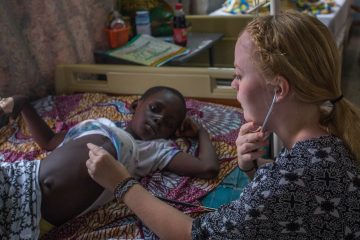
This project is NOT recruiting for the 2024-2025 cycle.
Ghana Medical Help is a charitable organization that has run community-led healthcare projects in the northernmost rural areas of Ghana since 2010 to improve the basic quality and availability of healthcare for over two million marginalized people. To learn more about Ghana Medical Help or its other ongoing projects, click on this link.
Project Title: The Maternity Service Agenda
Project Location: Upper East & Upper West Regions, Ghana
Positions: 1
Project Lead/Supervisor: Dr. Kelly Hadfield
Project Description: In the Upper Regions of Ghana, healthcare workers are unable to appropriately recognize and promptly manage maternal and neonatal emergencies, resulting in rising maternal and infant mortality in the Upper East Region and decreasing antenatal care coverage in the Upper West Region over the last 3 years. This is underpinned by inadequate knowledge, skills, and competencies in Emergency Obstetric and Neonatal Care (EmONC) among health workers, resulting from the unavailability of Continuing Medical Education (CME) in the Upper Regions. We are launching the Maternity Service Agenda (MSA) as an innovative approach to foster improvements in knowledge, skills, and competencies in EmONC, as a pathfinder for improved quality of care and reductions in maternal and newborn morbidity and mortality in the Upper Regions. Offering CME will empower health workers to better deliver EmONC services within the Networks of Practice and contribute to addressing equity and access gaps for essential health services.
Interested in getting involved? We are looking to on-board 1-2 medical students! Include a one-page letter in your application stating why you think that you would be a good fit for this project.
Contact Dr Kelly Hadfield at khadfield@ghanamedicalhelp.com for more information.
Ongoing Projects:
Project Title: Improving rural health infrastructure in northern Ghana
Project Description: Development of a pilot Computerized Maintenance Management System (CMMS) at the Bolgatanga Regional Hospital to document medical equipment, maintenance records and all other ancillary activities related to medical equipment.
Goals: Support healthcare delivery in rural communities and improve health outcomes of patients through well managed health technology infrastructure.
Benefits:
- Analysis of real-time inventory data, maintenance completion rates, medical equipment malfunction trends and decommissioning rates, to aid in capital planning and the overall decision making with capital resources (local, regional, national levels)
- Increased medical equipment uptime and availability to support patient care
- Identify quality improvement opportunities to improve best practices and standard of care
- Establish a global network of peer biomedical engineers for shared learning and support
- Gain a better understanding of how investing in rural health infrastructure in LMICs can translate to improved health outcomes and cost savings
Milestones:
- Preliminary design of the CMMS with Ms. Access – completed
- Acquisition of barcode printer and Gov’t approval of labels – completed
- Asset tagging and data input, w/ completion of the inventory database – completed
- Entering service information on repairs and maintenance activities; generation of reports and reviews – initiated
- Create and utilize preventative maintenance schedule with agreed upon methodology for prioritization
- Research and evaluation of project – *Opportunity for UBC Medical Student involvement in 2021/2022 Academic Year*
Future Directions:
- Support the roll-out of the CMMS to 15 District Hospitals in the UER and UWR
- Develop a web-based platform to integrate the data from standalone computers into a central repository
- Support the adoption of this project by Ghana Health Services as a standardized national engineering program
- Support the development of a standardized training program for new users
Broader Applications:
- Lessons in how to effectively create training and infrastructure opportunities in rural and remote communities
- Northern BC/Canada has similar disparities in health status, resource distribution, and infrastructure
- Inform other global health workers/NGOs/local governments
- Help reduce health inequities worldwide through disseminating project findings